Abstract
The Order Euglenida comprises many species and perhaps 40 genera, but almost all biochemical and genetic studies have been limited to a single species. Euglena gracilis, because of its ease of growth in the laboratory. Sequence studies of chloroplast and mitochondrial proteins from E. gracilis show that they have diverged widely from other eukaryotic lines. In the present paper we report the sequences of three proteins from another euglenoid, Euglena viridis, using material isolated from a natural bloom. The mitochondrial cytochrome c shows more than 90% sequence identity with that from E. gracilis, and contains the same characteristic features. The chloroplast cytochrome c6 has diverged to a greater extent and shows only 77% identity. The chloroplast ferredoxin from E. viridis is similar in sequence to those of cyanobacteria and algal chloroplasts, with sequence identities of up to 75%. Details of the purification, analysis and sequence determination experiments on the peptides have been deposited as Supplementary Publication SUP 50163 (32 pages) at the British Library Document Supply Centre, Boston Spa, Wetherby, West Yorkshire LS23 7BQ, U.K., from whom copies can be obtained on the terms indicated in Biochem. J. (1991) 273, 5.
Full text
PDF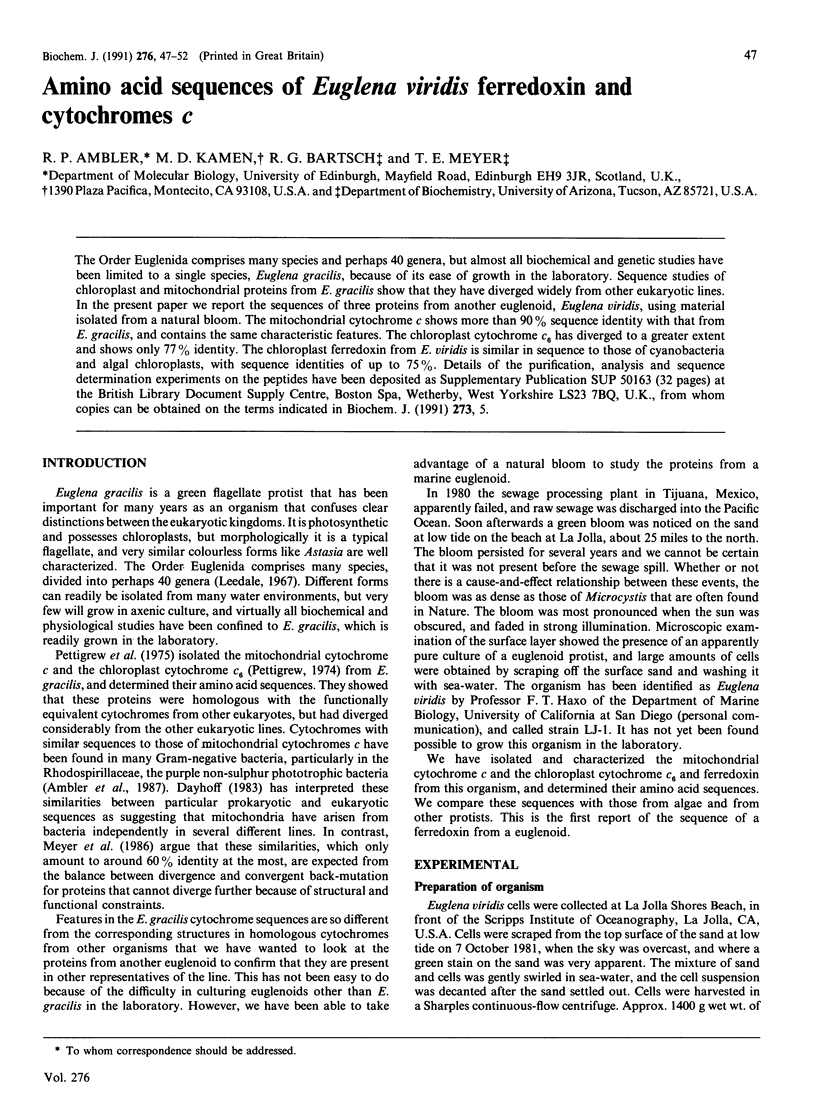
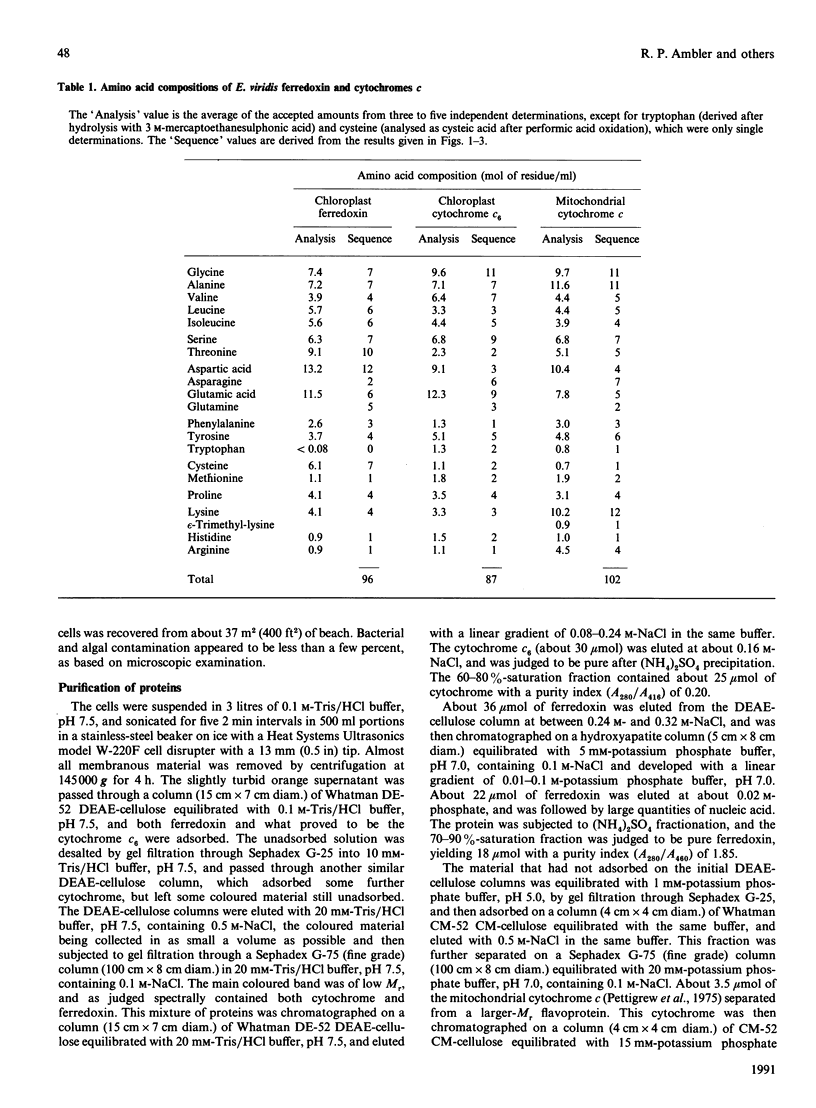
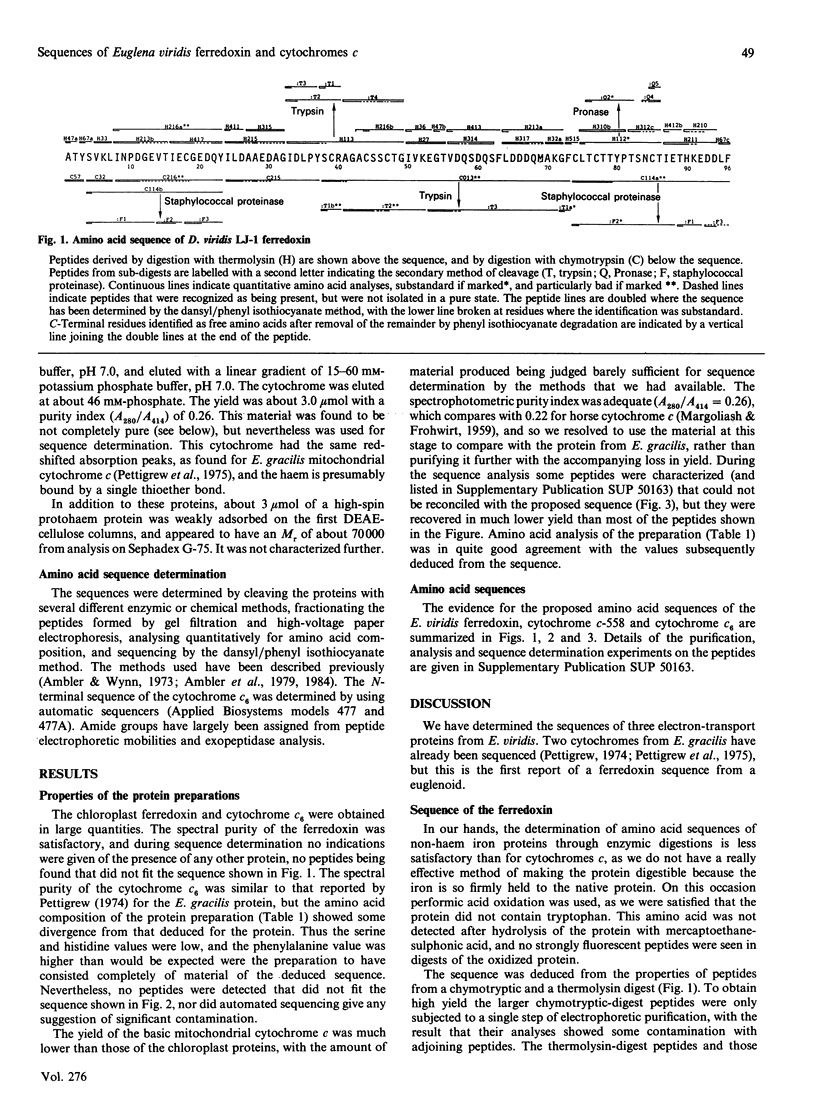
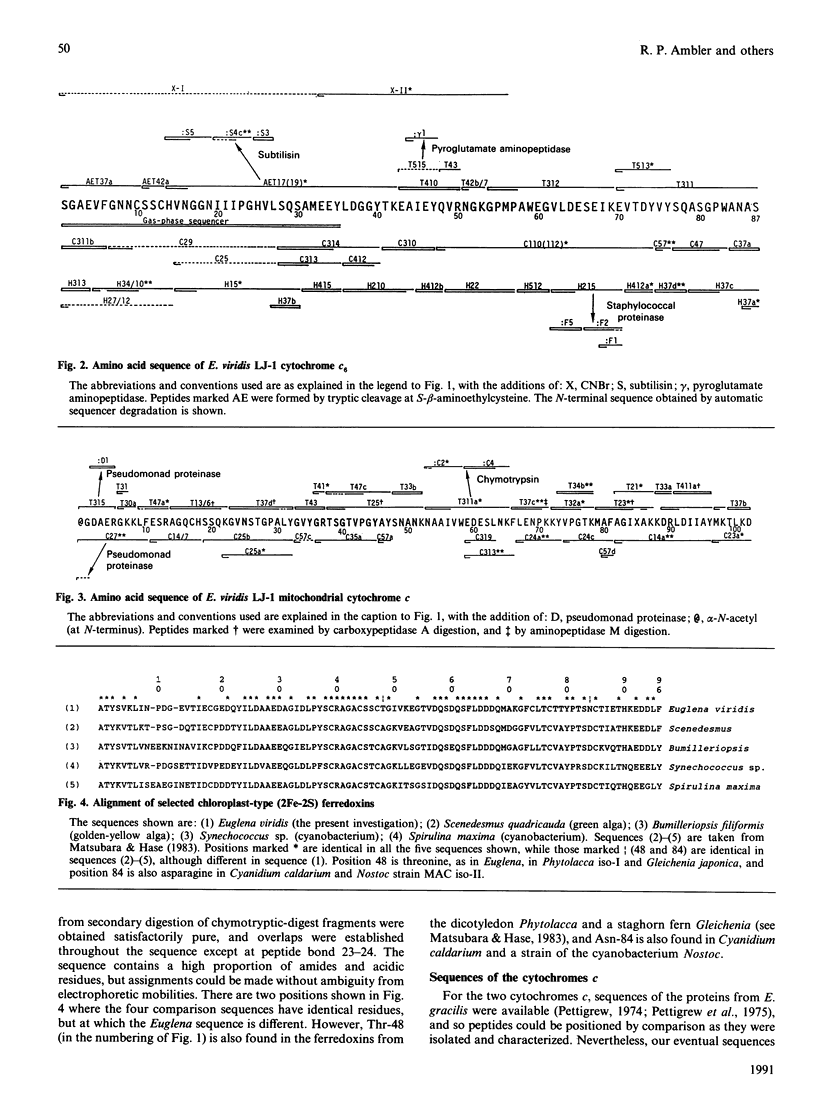
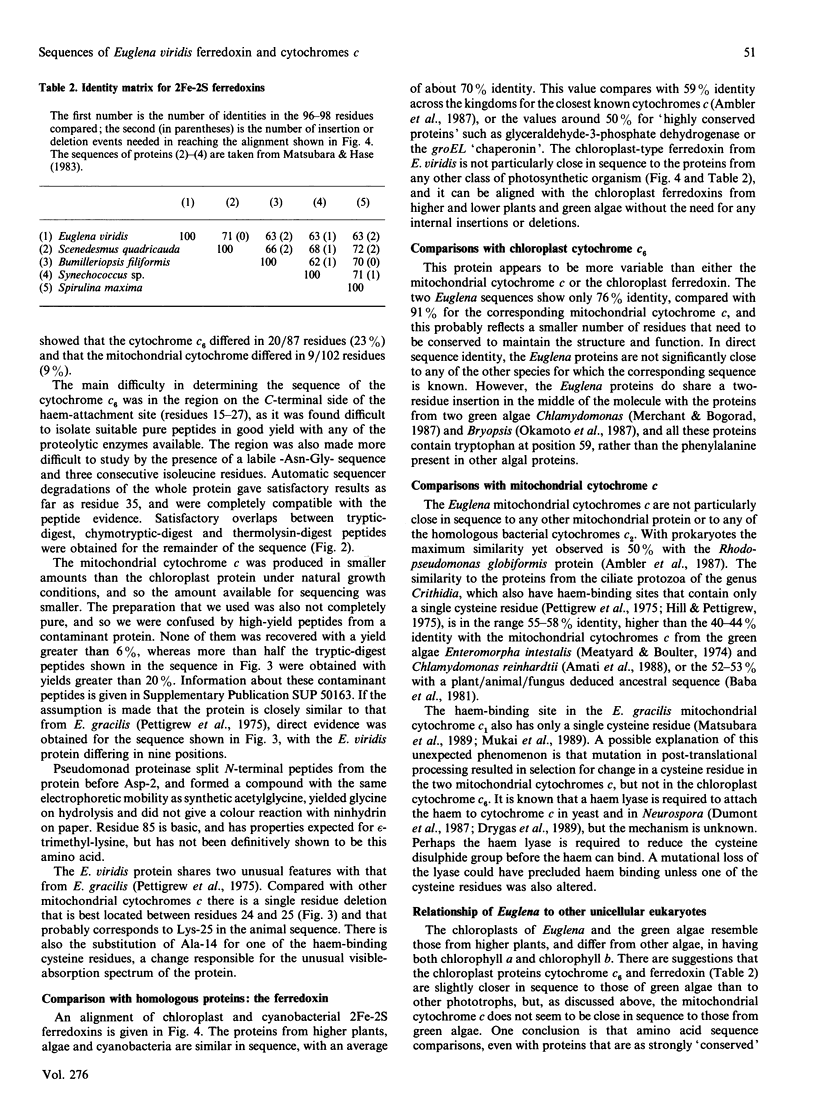
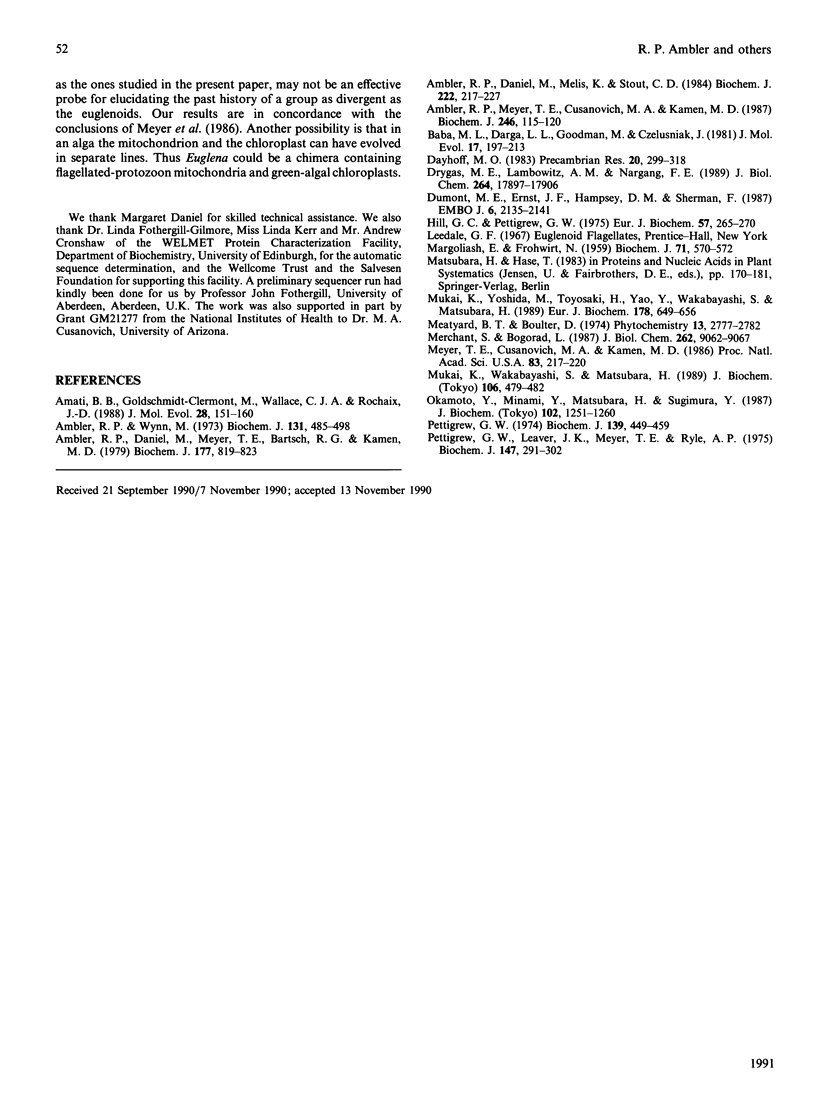
Selected References
These references are in PubMed. This may not be the complete list of references from this article.
- Amati B. B., Goldschmidt-Clermont M., Wallace C. J., Rochaix J. D. cDNA and deduced amino acid sequences of cytochrome c from Chlamydomonas reinhardtii: unexpected functional and phylogenetic implications. J Mol Evol. 1988 Dec;28(1-2):151–160. doi: 10.1007/BF02143507. [DOI] [PubMed] [Google Scholar]
- Ambler R. P., Daniel M., Melis K., Stout C. D. The amino acid sequence of the dihaem cytochrome c4 from the bacterium Azotobacter vinelandii. Biochem J. 1984 Aug 15;222(1):217–227. doi: 10.1042/bj2220217. [DOI] [PMC free article] [PubMed] [Google Scholar]
- Ambler R. P., Daniel M., Meyer T. E., Bartsch R. G., Kamen M. D. The amino acid sequence of cytochrome c' from the purple sulphur bacterium Chromatium vinosum. Biochem J. 1979 Mar 1;177(3):819–823. doi: 10.1042/bj1770819. [DOI] [PMC free article] [PubMed] [Google Scholar]
- Ambler R. P., Meyer T. E., Cusanovich M. A., Kamen M. D. The amino acid sequence of the cytochrome c2 from the phototrophic bacterium Rhodopseudomonas globiformis. Biochem J. 1987 Aug 15;246(1):115–120. doi: 10.1042/bj2460115. [DOI] [PMC free article] [PubMed] [Google Scholar]
- Ambler R. P., Wynn M. The amino acid sequences of cytochromes c-551 from three species of Pseudomonas. Biochem J. 1973 Mar;131(3):485–498. doi: 10.1042/bj1310485. [DOI] [PMC free article] [PubMed] [Google Scholar]
- Baba M. L., Darga L. L., Goodman M., Czelusniak J. Evolution of cytochrome C investigated by the maximum parsimony method. J Mol Evol. 1981;17(4):197–213. doi: 10.1007/BF01732758. [DOI] [PubMed] [Google Scholar]
- Drygas M. E., Lambowitz A. M., Nargang F. E. Cloning and analysis of the Neurospora crassa gene for cytochrome c heme lyase. J Biol Chem. 1989 Oct 25;264(30):17897–17906. [PubMed] [Google Scholar]
- Hill G. C., Pettigrew G. W. Evidence for the amino-acid sequence of Crithidia fasciculata Cytochrome c555. Eur J Biochem. 1975 Sep 1;57(1):265–271. doi: 10.1111/j.1432-1033.1975.tb02298.x. [DOI] [PubMed] [Google Scholar]
- MARGOLIASH E., FROHWIRT N. Spectrum of horse-heart cytochrome c. Biochem J. 1959 Mar;71(3):570–572. doi: 10.1042/bj0710570. [DOI] [PMC free article] [PubMed] [Google Scholar]
- Merchant S., Bogorad L. The Cu(II)-repressible plastidic cytochrome c. Cloning and sequence of a complementary DNA for the pre-apoprotein. J Biol Chem. 1987 Jul 5;262(19):9062–9067. [PubMed] [Google Scholar]
- Meyer T. E., Cusanovich M. A., Kamen M. D. Evidence against use of bacterial amino acid sequence data for construction of all-inclusive phylogenetic trees. Proc Natl Acad Sci U S A. 1986 Jan;83(2):217–220. doi: 10.1073/pnas.83.2.217. [DOI] [PMC free article] [PubMed] [Google Scholar]
- Mukai K., Wakabayashi S., Matsubara H. Molecular cloning and nucleotide sequence of a cDNA encoding Euglena gracilis cytochrome c1. J Biochem. 1989 Sep;106(3):479–482. doi: 10.1093/oxfordjournals.jbchem.a122877. [DOI] [PubMed] [Google Scholar]
- Mukai K., Yoshida M., Toyosaki H., Yao Y., Wakabayashi S., Matsubara H. An atypical heme-binding structure of cytochrome c1 of Euglena gracilis mitochondrial complex III. Eur J Biochem. 1989 Jan 2;178(3):649–656. doi: 10.1111/j.1432-1033.1989.tb14494.x. [DOI] [PubMed] [Google Scholar]
- Okamoto Y., Minami Y., Matsubara H., Sugimura Y. Studies on algal cytochromes VI: some properties and amino acid sequence of cytochrome c6 from a green alga, Bryopsis maxima. J Biochem. 1987 Nov;102(5):1251–1260. doi: 10.1093/oxfordjournals.jbchem.a122164. [DOI] [PubMed] [Google Scholar]
- Pettigrew G. W., Leaver J. L., Meyer T. E., Ryle A. P. Purification, properties and amino acid sequence of atypical cytochrome c from two protozoa, Euglena gracilis and Crithidia oncopelti. Biochem J. 1975 May;147(2):291–302. doi: 10.1042/bj1470291. [DOI] [PMC free article] [PubMed] [Google Scholar]
- Pettigrew G. W. The purification and amino acid sequence of cytochrome C-552 from Euglena gracilis. Biochem J. 1974 May;139(2):449–459. doi: 10.1042/bj1390449. [DOI] [PMC free article] [PubMed] [Google Scholar]


